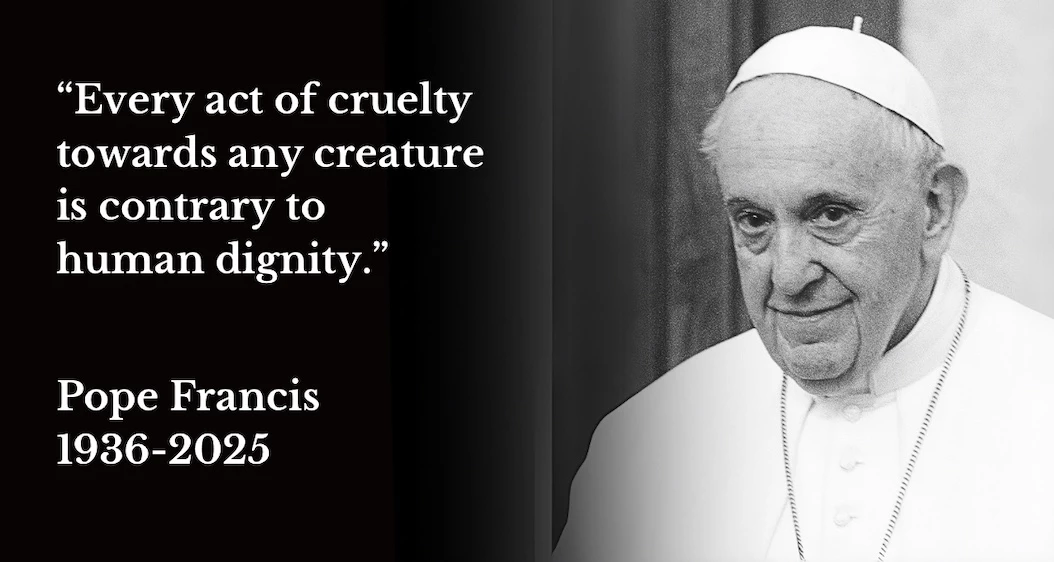
Pope Francis’ Warm Embrace of Protecting God’s Creation
- Wayne Pacelle
You can listen to an AI-generated reading of this story here:
The passing of Pope Francis marks a moment to remember the man and his selfless teachings. Indeed, when the College of Cardinals elected Argentinian Cardinal Jorge Mario Bergoglio in 2013, there was special excitement among animal welfare advocates about the man who would lead the one-billion-member Roman Catholic Church. Appropriately, the pontiff chose his papal name in tribute to St. Francis of Assisi, the patron saint of the poor as well as animals and the environment.
No public declaration was more forceful or eagerly anticipated than Francis’ 200-page encyclical about animals and nature, issued in June 2015.
“Our indifference or cruelty towards fellow creatures of this world sooner or later affects the treatment we mete out to other human beings,” he wrote in Laudato Si (Praised Be). “We have only one heart, and the same wretchedness which leads us to mistreat an animal will not be long in showing itself in our relationships with other people. Every act of cruelty towards any creature is ‘contrary to human dignity.’”
These were powerful, unambiguous words from the world’s most influential clerical leader, who called on the global community to end cosmetic testing on animals, halt the abuse of animals in agribusiness, and end the extinction crisis. He associated himself squarely with the idea of the humane economy and the ethical marketplace, repeating the dictum of his predecessor, also a friend to animals, Pope Benedict: “(P)urchasing is always a moral — and not simply economic — act.”
“We read in the Gospel that Jesus says of the birds of the air that ‘not one of them is forgotten before God,’ (Lk 12:6),” Pope Francis wrote. He continued:
“How then can we possibly mistreat them or cause them harm? I ask all Christians to recognize and to live fully this dimension of their conversion. May the power and the light of the grace we have received also be evident in our relationship to other creatures and to the world around us. In this way, we will help nurture that sublime fraternity with all creation which Saint Francis of Assisi so radiantly embodied.”
The Pope did not invent a Catholic Catechism on concern for other creatures — he was reminding us of one implicitly already in place and underscoring its urgency and relevance to our daily lives. Throughout the Bible, there are calls for mercy — the “righteous man regardeth his beast, but the tender mercies of the wicked are cruel.”
In fact, God in the Old Testament says quite clearly that animals belong to him, meaning that they are not ours to abuse: “And the Lord said: ‘For every wild animal of the forest is mine, the cattle on a thousand hills. I know all the birds of the air, and all that moves in the field is mine.’” (Psalm 50: 10-11) Old fasting practices that are still observed, dietary and slaughter rules, and prayers before meals keep these principles alive with Christians while acknowledging the stain of violence against animals.
The spirit of mercy is found in all the world’s great religions, and they remind us of our charge in caring for Creation. Hinduism teaches that the Divine exists in all living beings, so all animals are to be accorded respect and compassion, and many Hindu gods take animal forms, including the elephant god Ganesha and the monkey god Hanuman. Jainism calls on its followers to adhere to the principle of ahimsa, or nonviolence, and both Hindus and Jains have a special devotion to cows, who are viewed as symbols of motherhood. Not only are there religious and legal proscriptions against killing them, but throughout India there are thousands of shelters, known as goshalas, for homeless or ailing cows.
The highest Buddhist virtue is compassion, meaning avoiding causing suffering or death to any sentient being, and the Dalai Lama has called for an end to all forms of animal abuses. The Jewish principle of Tza’ar ba’alei chayim, or “the suffering of living creatures,” prohibits inflicting unnecessary pain on animals. The Qur’an and Hadith of Islam, whatever cruel customs might be carried on in their name, both describe the Prophet Muhammad as having great compassion for animals.
Pope Francis breathed life into the Catholic Catechism when it came to animals with the release of his encyclical in 2015. His message has spread with impact and the invocation to be good to animals now finds voice in so many influencers — from the world’s business leaders, academicians, politicians, and pundits. But when we call the roll of men and women who raised their voices and asked for urgent action in defense of God’s creation, Pope Francis must humbly accept his place at or near the top of that list.
Wayne Pacelle is president of Animal Wellness Action and the Center for a Humane Economy and a two-time New York Times best-selling author.
Dear reader: If you support substantive policy work to protect animals, please consider donating to the Center for a Humane Economy today. You can give any amount one time, or make it a monthly gift, as many of our supporters do. Thank you for helping us fight for all animals. Please go here to make your contribution.